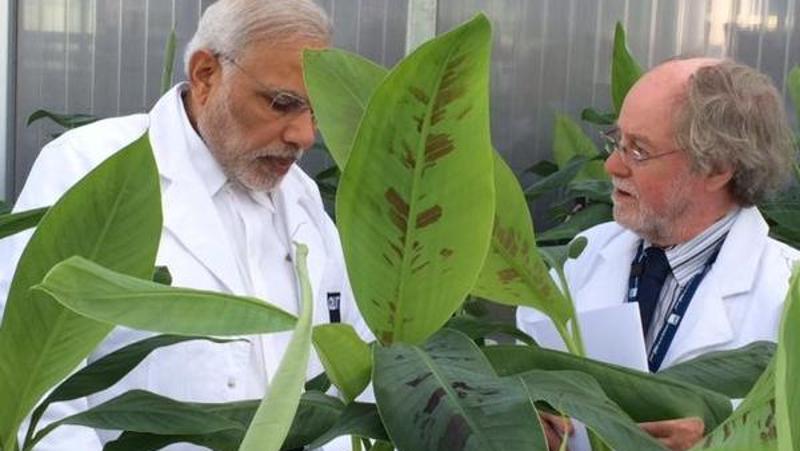
A humanitarian research partnership between QUT and the Indian Government is enabling scientists to collaborate to develop Indian bananas that are high in iron and provitamin A.
QUT's Centre for Tropical Crops and Biocommodities director, Distinguished Professor James Dale, said QUT scientists were developing the technique to generate Australian bananas rich in iron and would then transfer this technology to India so that Indian scientists could generate Indian bananas rich in iron.
"This is the first agricultural technology transfer project the Indian Government has been involved with and QUT is very appreciative of this opportunity to not only collaborate with Indian scientists but to also help build India's scientific capacity in this regard," Professor Dale said.
Professor Dale said the $AUD1.25 million project was funded by the Government of India's Biotechnology Industry Research Assistance Council (BIRAC).
Professor Dale met with the Prime Minister of the Republic of India Mr Narendra Modi at QUT's Science and Engineering Centre and briefed him on the project's progress while in the greenhouse. Mr Modi is in Brisbane for the G20 Leaders' Summit.
Professor Dale's team is working in partnership with the National Agr-Food Biotechnology Institute, the Bhabha Atomic Research Centre, National Research Centre for Bananas, Tamil Nadu Agricultural University and Indian Institute of Horticulture Research.
"This is very much a joint project with enormous humanitarian potential," Professor Dale said.
"Bananas are a staple crop across southern India in particular, and an ability for India to produce bananas that are high in iron will assist in preventing anaemia, a major cause of maternal death in childbirth.
"Women who eat a vegetarian diet that is low in iron and don't have access to supplements are at risk of massive bleeding during childbirth.
"Iron deficiency is a problem for all developing countries, and is associated with diets low in iron, not just vegetarianism."
He said the iron gene that was being manipulated was from rice and that research was progressing well, with iron-rich bananas currently in field trials in north Queensland.
Professor Dale said his team was currently developing provitamin A enriched bananas for Uganda and this technology would also be transferred to Indian bananas over time to enable bananas to be rich in both iron and provitamin A and therefore be a highly nutritious food source.
Media contact: Rose Trapnell, QUT media team leader, 07 3138 2361 or 0407 585 901 rose.trapnell@qut.edu.au


